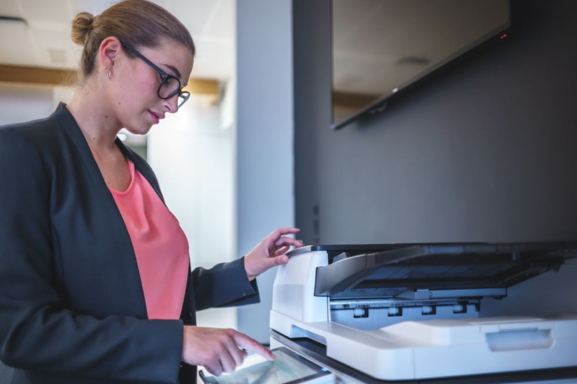How to Secure Your Office Copier and Prevent Data Breaches
You’re probably used to keeping your PCs constantly updated to guard against new security threats. But what about your printers? The office copier is actually a major weak point in the network security of many businesses. In particular, any machine more than five years old is at greater risk of being compromised just by virtue of its age.
So, it’s important to know how to secure a machine that’s likely to be used by all your employees, yet is often overlooked in terms of safety. This article will fill you in about the threats that your printer is exposed to, and how best to guard against them.
The Risk of an Office Copier
It’s easy to forget that an office copier is similar to a laptop or PC in many ways. It’s a machine that connects to a network, has its own IP address, and runs off software and an operating system – just like a PC. The fact that it copies, prints, and scans are, in a sense, bonus features. Just like any PC then, an office copier is at risk of cyberattack. In fact, 61% of organizations suffered some form of printer-related data loss in 2022 and 2023 alone.
The printer is often a weak point in network security, which can be exacerbated by its age and insufficient protection. Because everyone on the network is in effect connected to the office copier, a hacker that gains entry to your network through it can easily jump to any connected device and wreak havoc, for example by cloning RFID security badges.
But it’s not just the network that’s at risk. An office copier often stores documents on its hard drive for printing and storage purposes. A hacker that gains access to these documents could sell the private employee and sensitive business information they contain to the highest bidder. Or, the hacker could use them for corporate espionage or phishing attacks.
Some other major threats to an unsecured copier include:
- Firewall attack – Any breach in a firewall could leave your printer open to infiltration.
- Open network – If anyone on the network has access to your copier, then the chance of an attack is much higher. Unrestricted access can lead to hacking or DDoS attacks.
- Remote access – Giving external users remote access to a network device can be convenient, but opens it up to external control.
To cut a long story short, an unprotected printer is simply not worth the risks.
Improving Copier Safety
When purchasing an office copier, security should be as high a priority as the spec sheet. Your print supplier should be able to provide you with a list of possible security solutions. And if they offer managed print services, they may even provide some cover. But there are steps you can take to protect yourself. Here are some of the main ways:
Regular Updates
Just like on a PC, the office copier’s software needs to be updated constantly to keep up with the never-ending arms race that is modern network security. The latest firmware not only provides your machine with new features, but the strongest security measures available. Hardware and software communication issues can also be weak points in security, which updates also address.
That said, constantly updating firmware for older models won’t remain feasible forever. Sooner or later, every copier’s systems will no longer be supported by its manufacturer. And after a time, older encryption methods are simply no longer updatable. This is what makes older models so vulnerable.
Engage Security Measures
Most office copiers come with some form of security or antivirus software. As they boot up, these programs should start running automatically. That said, they can often slow down boot up time, which can be highly frustrating for employees on a tight deadline. Though it may be tempting, keep all security measures enabled, and don’t sacrifice safety for speed.
Managed IT Services
Managed IT Services is a broad term describing a range of solutions to the IT needs of businesses. These services can be offered by a specialist company, a retailer, or both. Part of this umbrella is dedicated to security, namely:
- Network security – A provider will proactively and reactively monitor a business network for any unauthorized access, which may also involve tracking down breaches. Network security is typically monitored off-site.
- Antivirus and firewall – The service provider not only installs security software, but keeps it updated and monitors for any issues.
- Access control – Many internal breaches occur as a result of employees gaining access to private or sensitive data that shouldn’t be available to them. This can happen accidentally, or deliberately. Access control uses measures like biometric data and two-factor authentication to restrict access to devices and parts of the network.
- Device security – Unsecured tablets, smartphones, and other devices – especially employee’s personal devices – can be a gateway for malware and trojans. The provider will implement measures like apps to control access to copiers in order to keep them safe.
- Training – Some providers will provide network safety training for your employees, where the dangers that arise from negligence and how to prevent them will be explained.
Safe Printing Practices
It’s not just your office copier’s software that presents data security risks. Physical prints left lying in the tray can be at risk of prying eyes, too. So, sensitive documents shouldn’t be left out in the open. To this end, implement measures like pull printing, which needs user authentication on the copier itself before printing, or hold printing, which requires the user to be present at the device.
Regular Print Audits
Some print services will offer audits on your office copier’s activities, but this is a task that can be performed in-house, too. Make use of your machine’s event logging features to track suspicious activities, and keep audit trails of all past print jobs for good measure.
Device Disposal
Eventually, even the sturdiest office copier reaches the end of its life and must be disposed of. At this time, besides the environmental concerns, there’s also the safety of your data to consider. The copier’s hard drive should be completely wiped before disposal to prevent access to any old files that may still remain on it.
Some like to do this by overwriting systems with junk files or null data, while others take a more practical approach and destroy it with a hammer and nails. Either way, the data on the drive should be dealt with conclusively.
The Right Office Copier Partner
Your peace of mind with respect to office copier security should begin from the moment you choose your device. To that end, you need a company that has intimate knowledge of the printing security landscape, and is tried and tested when it comes to providing dedicated print services.
Stargel has been serving the Houston area for well over 30 years. We offer the best office solutions because we know what works best. Contact us to discuss the best ways to keep you ahead of the game – and safe.



